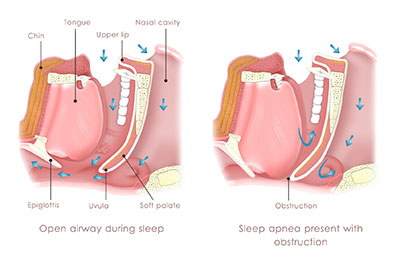Obstructive Sleep Apnea, Sleep Disorders & Snoring Treatment
Sleep Treatment to Cure Your Sleep Apnea In Washington D.C.
Sleep disordered breathing is an umbrella diagnosis which includes individuals with snoring and sleep apnea. Almost all individuals who have sleep apnea, also have very loud snoring. Conversely, if one snores, it does not necessarily mean that there is apnea also. One can have a suspicion that apnea may be an issue. Spouses and family members frequently are the first to suspect a sleep disorder. However, patients are almost never aware of their snoring or apnea. The only way to definitively diagnose sleep apnea is with a sleep study.
Sleep Apnea and Snoring Treatments
Schedule an Appointment Today
Treatment Options to Cure Your Sleep Apnea
There are a number of options to address your sleep apnea and sleep issues.
Deciding on the best option involves an evaluation by one of our board-certified physicians. The cause and site of airway obstruction is determined by examining the upper aerodigestive tract, the entire upper airway including the nasal cavity, throat and voice box regions. Based on a complete evaluation and examination, a treatment recommendation is made. Treatment option may include the following:


Selected in Washingtonian Top Doctors Since 1998
Dr. Winkler is an extremely talented and dedicated physician who listens carefully and considers the whole health history as he develops a treatment plan…He’s appropriately cautious and will demur on a procedure if there’s a safer alternative. However, if a procedure is warranted, he has the talent to do it well.
Everything about this office is excellent; Dr. Winkler is superb. Most thorough history and exam; patient and thorough explanations of everything; …produced great improvement in a problem that had festered for months…Could not be better!!
My child’s pediatrician recommended Dr. Winkler as her first choice to perform a tonsillectomy…Dr. Winkler was matter-of-fact, friendly, unhurried, professional, and has a wicked sense of humor…His follow-up care was thorough, kind, accurate, and timely. He’s a top notch doctor!
Our niece had a tough recovery from surgery due to her already being sick …. Dr. Winkler was amazing. Called us every single day for two weeks. Saw us as necessary. I will use him again in a heartbeat.
My husband has been fighting a rare and deadly cancer that was found in his nose by Dr. Hao for over six years now. We both truly believe that if not for the professionalism and concern that has shown us over those years, that my husband would not be alive today. We cannot praise Dr. Hao enough.
I met with Dr. Capobianco a few months ago and she was fantastic…It has been a game changer in terms of life style…Dr. Capobianco was extremely professional, helpful and a joy to work with. I would recommend her and the staff at the office without hesitation. They are always helpful and friendly.





